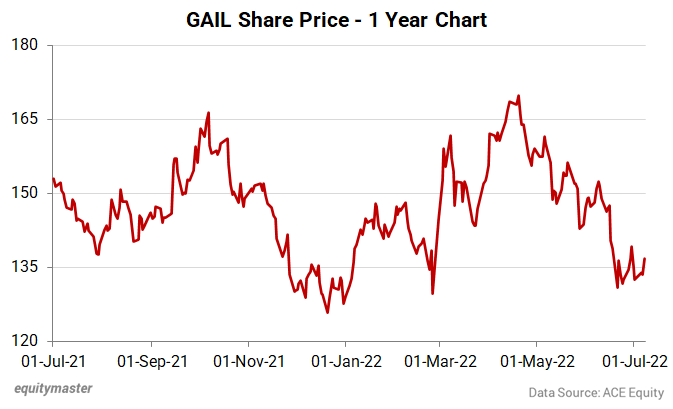- Home
- Views On News
- Jul 8, 2022 - Why GAIL Share Price is Falling
Why GAIL Share Price is Falling

Energy was one of the sectors that benefited big time from the backdrop of the Russia - Ukraine war.
Crude oil prices hit the roof with the world putting an embargo on Russian oil imports.
As a matter of fact, the prices touched US$ 130 a barrel in March 2022, the highest ever in the last 8 years. The last time crude oil prices crossed the US$ 130 mark was way back in 2014 as a result of the declining oil supply.
If history is anything to go by, energy stocks have conventionally been viewed as a proxy for the many ups and downs in international crude oil prices.
The relationship is simple. If crude oil prices skyrocket, so will the price of energy shares. On the other hand, if there were a fall in crude oil prices globally, energy stocks are at a high risk of going into a freefall.
The tide seems to have turned now.
Energy stocks tumbled as a response to falling crude oil prices.
Among the lot, GAIL India, a government of India undertaking in the natural gas space took a plunge, nearing its 52 week low of Rs 125 apiece this week.
So, what are the reasons that could have triggered this tailspin in GAIL's share price?
Let's find out.
#1 Sudden Windfall Tax Announcement
The government of India has announced a windfall tax that is expected to negatively impact oil and gas companies in the country.
The export duty of Rs 6 per litre is being levied on auto fuel including petrol and aviation turbine fuel (ATF). A special excise duty of Rs 13 per litre will be applicable to the export of diesel. This move is expected to affect both exporters and refineries including GAIL India.
Additionally, a cess of Rs 23,250 per tonne is to be levied on domestically produced crude oil. This is expected to have some adverse impact on the earnings of government owned oil and gas producers as well as private players.
Following this announcement on Friday last week, shares of oil and gas companies saw a steep fall.
Reliance share price fell 8% while ONGC tumbled up to 15%.
This is not the first time that the central government has flirted with a windfall tax. 2008 and 2018 were years when oil prices were sky high and most Indian oil and gas companies made a killing.
That said, in both years, the idea was abandoned.
So, the question is what drove the central government towards this step in 2022?
Perhaps the super high gains that the oil and gas companies were enjoying with the export of refined crude products was a reason to impose the tax. Another reason could be to arrest the elevated crude oil prices.
Lastly, the measure could help offset the ballooning public expenditures on fuel, food, and fertilizer subsidies in the middle of skyrocketing inflation.
From the perspective of the oil and gas companies like GAIL, this announcement is a damper. The move was sudden, and the government is yet to clarify the duration of the period for which it is being levied.
Moreover, the government has not specified the slabs as to at what level of crude prices the taxes are available keeping in mind that the crude oil prices will not be high in perpetuity.
#2 Correction in Crude Oil Prices
The Russia - Ukraine war had triggered a scenario that led to crude oil prices touching an 8 year high. Add to that the sanctions imposed by the US on Iran led to more supply concerns in the energy market.
These events were mostly concentrated in the first half of 2022 which resulted in oil and gas companies across the globe including Indian enjoying extraordinary gross margins on crude oil exports.
However, a dramatic turnaround ensued, and crude oil prices are now on a correction path amidst the fears of a recession. This has impacted the global demand outlook for crude oil.
Needless to say, this will weaken the demand for oil and gas.
The fall in crude oil prices can also be attributed to central banks around the world hiking interest rates to control global inflation.
What Does the Future Look Like for the Oil and Gas Industry?
Agreed that there is a global energy crisis on the back of high commodity prices.
Despite that, investors remain optimistic as they expect the price of crude oil which largely regulates stock prices of oil and gas companies to remain above US$ 60 per barrel.
There is also investor enthusiasm for the emerging natural gas sector which is expected to a critical bridging role between traditional hydrocarbons and renewable energy sources to help the world decarbonize.
Companies like GAIL will reap long term benefits despite the downturn brought on by the windfall announcement by the government of India and slumping crude oil prices in the short term.
GAIL is also one of the top renewable energy companies which has big investments in the renewable space.
It is setting up a green hydrogen plant, making it one of the green hydrogen companies in India.
How has GAIL Performed Recently?
GAIL reported an uptick in the quarterly net profit by 4.1% on a sequential basis in the third quarter of the financial year 2021-22. Margins also improved.
The company's shares were trading at Rs 170 per piece, nearly a 52 week high in April 2022.
The fourth quarter took a dip that has now deflated the share price down to approximately Rs 130 apiece in July 2022.
Over the last 30 days, GAIL share price is down 7.8%.
In spite of the fall in share price, GAIL continues on a defined growth path. The company expects to increase its gas transmission volumes by 5% to 5% year on year (YoY). This will help boost the supply to city gas and fertilizer plants.
Its current market cap stands at Rs 599.9 bn.

About GAIL
A government of India enterprise, GAIL India was incorporated in 1984 and is an integrated natural gas company in India.
The company directly owns more than 11,500 km of natural gas pipelines and over 2,300 km of LPG pipelines along with six LPG gas-processing units, and a petrochemicals facility. In fact, GAIL is the first company in India to own and operate pipelines for LPG transmission in the country.
GAIL has recently announced its interest in investing in start-ups operating in natural gas, petrochemicals, energy, project management, bio-manure marketing, nano materials, IoT, data mining, environment, health, and social through a dedicated initiative called 'Pankh'.
For more details about the company, you can have a look at GAIL's factsheet and GAIL's quarterly results on our website.
You can also compare GAIL with its peers.
Happy Investing!
Disclaimer: This article is for information purposes only. It is not a stock recommendation and should not be treated as such. Learn more about our recommendation services here...


Equitymaster requests your view! Post a comment on "Why GAIL Share Price is Falling". Click here!
Comments are moderated by Equitymaster, in accordance with the Terms of Use, and may not appear
on this article until they have been reviewed and deemed appropriate for posting.
In the meantime, you may want to share this article with your friends!